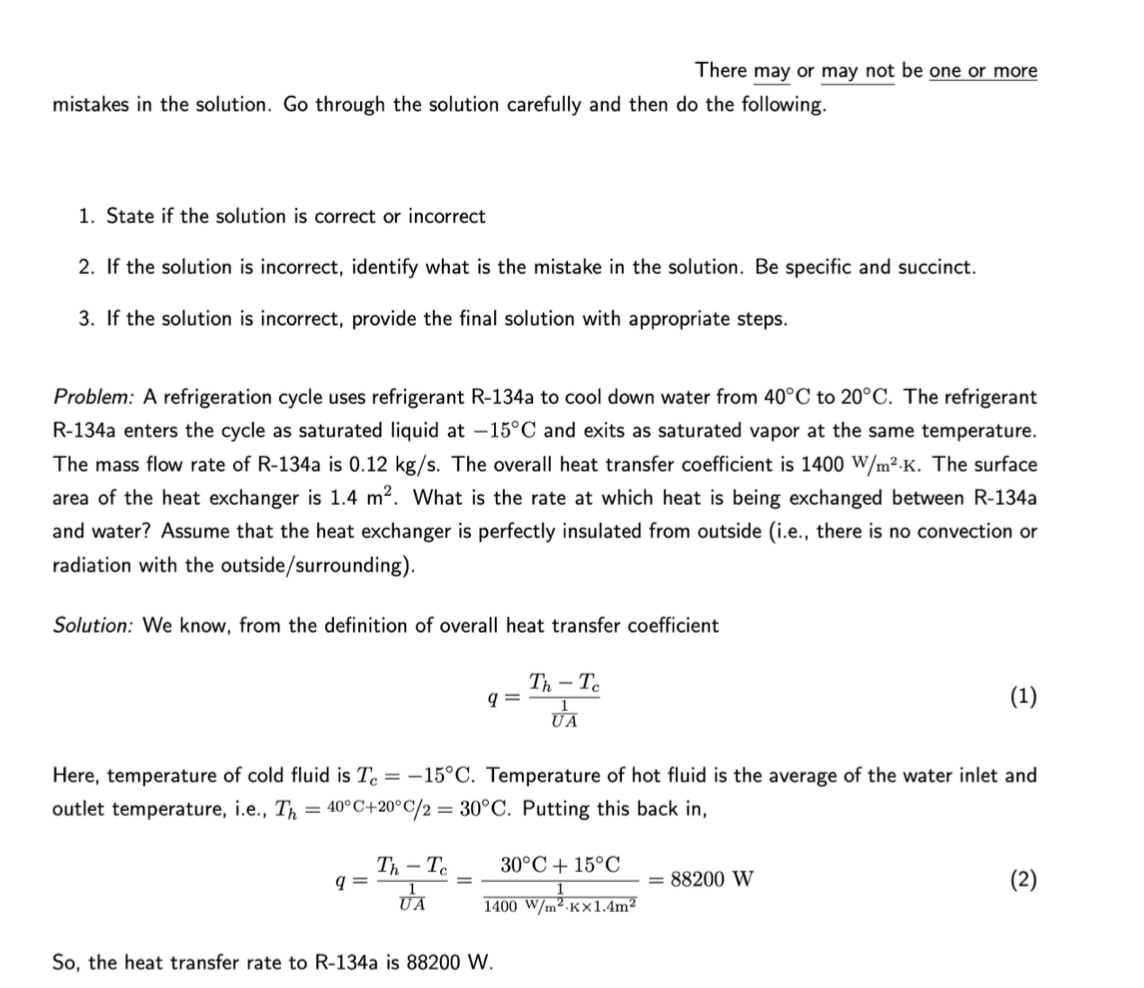1. State if the solution is correct or incorrect 2. If the solution is incorrect, identify what is the mistake in the solution. Be specific and succinct. 3. If the solution is incorrect, provide the final solution with appropriate steps. Problem: A refrigeration cycle uses refrigerant R-134a to cool down water from 40°C to 20°C. The refrigerant R-134a enters the cycle as saturated liquid at -15°C and exits as saturated vapor at the same temperature. The mass flow rate of R-134a is 0.12 kg/s. The overall heat transfer coefficient is 1400 W/m².K. The surface area of the heat exchanger is 1.4 m². What is the rate at which heat is being exchanged between R-134a and water? Assume that the heat exchanger is perfectly insulated from outside (i.e., there is no convection or radiation with the outside/surrounding).
1. State if the solution is correct or incorrect 2. If the solution is incorrect, identify what is the mistake in the solution. Be specific and succinct. 3. If the solution is incorrect, provide the final solution with appropriate steps. Problem: A refrigeration cycle uses refrigerant R-134a to cool down water from 40°C to 20°C. The refrigerant R-134a enters the cycle as saturated liquid at -15°C and exits as saturated vapor at the same temperature. The mass flow rate of R-134a is 0.12 kg/s. The overall heat transfer coefficient is 1400 W/m².K. The surface area of the heat exchanger is 1.4 m². What is the rate at which heat is being exchanged between R-134a and water? Assume that the heat exchanger is perfectly insulated from outside (i.e., there is no convection or radiation with the outside/surrounding).
Elements Of Electromagnetics
7th Edition
ISBN:9780190698614
Author:Sadiku, Matthew N. O.
Publisher:Sadiku, Matthew N. O.
ChapterMA: Math Assessment
Section: Chapter Questions
Problem 1.1MA
Related questions
Question
show all steps

Transcribed Image Text:There may or may not be one or more
mistakes in the solution. Go through the solution carefully and then do the following.
1. State if the solution is correct or incorrect
2. If the solution is incorrect, identify what is the mistake in the solution. Be specific and succinct.
3. If the solution is incorrect, provide the final solution with appropriate steps.
Problem: A refrigeration cycle uses refrigerant R-134a to cool down water from 40°C to 20°C. The refrigerant
R-134a enters the cycle as saturated liquid at -15°C and exits as saturated vapor at the same temperature.
The mass flow rate of R-134a is 0.12 kg/s. The overall heat transfer coefficient is 1400 W/m².K. The surface
area of the heat exchanger is 1.4 m². What is the rate at which heat is being exchanged between R-134a
and water? Assume that the heat exchanger is perfectly insulated from outside (i.e., there is no convection or
radiation with the outside/surrounding).
Solution: We know, from the definition of overall heat transfer coefficient
9
q=
Th-Te
UA
Here, temperature of cold fluid is Te = -15°C. Temperature of hot fluid is the average of the water inlet and
outlet temperature, i.e., Th= 40°C+20°C/2 = 30°C. Putting this back in,
Th-Te
UA
30°C +15°C
1
1400 W/m².KX1.4m²
So, the heat transfer rate to R-134a is 88200 W.
(1)
88200 W
~
Expert Solution
This question has been solved!
Explore an expertly crafted, step-by-step solution for a thorough understanding of key concepts.
Step by step
Solved in 3 steps

Knowledge Booster
Learn more about
Need a deep-dive on the concept behind this application? Look no further. Learn more about this topic, mechanical-engineering and related others by exploring similar questions and additional content below.Recommended textbooks for you

Elements Of Electromagnetics
Mechanical Engineering
ISBN:
9780190698614
Author:
Sadiku, Matthew N. O.
Publisher:
Oxford University Press

Mechanics of Materials (10th Edition)
Mechanical Engineering
ISBN:
9780134319650
Author:
Russell C. Hibbeler
Publisher:
PEARSON

Thermodynamics: An Engineering Approach
Mechanical Engineering
ISBN:
9781259822674
Author:
Yunus A. Cengel Dr., Michael A. Boles
Publisher:
McGraw-Hill Education

Elements Of Electromagnetics
Mechanical Engineering
ISBN:
9780190698614
Author:
Sadiku, Matthew N. O.
Publisher:
Oxford University Press

Mechanics of Materials (10th Edition)
Mechanical Engineering
ISBN:
9780134319650
Author:
Russell C. Hibbeler
Publisher:
PEARSON

Thermodynamics: An Engineering Approach
Mechanical Engineering
ISBN:
9781259822674
Author:
Yunus A. Cengel Dr., Michael A. Boles
Publisher:
McGraw-Hill Education

Control Systems Engineering
Mechanical Engineering
ISBN:
9781118170519
Author:
Norman S. Nise
Publisher:
WILEY

Mechanics of Materials (MindTap Course List)
Mechanical Engineering
ISBN:
9781337093347
Author:
Barry J. Goodno, James M. Gere
Publisher:
Cengage Learning

Engineering Mechanics: Statics
Mechanical Engineering
ISBN:
9781118807330
Author:
James L. Meriam, L. G. Kraige, J. N. Bolton
Publisher:
WILEY